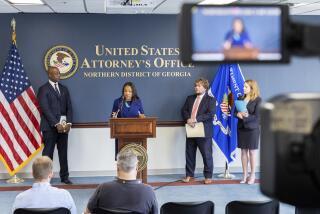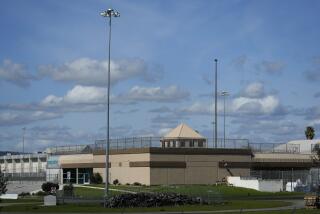Audit Assails Lax, Wasteful Running of Folsom Prison
- Share via
SACRAMENTO — Management problems in operating violence-plagued Folsom Prison, ranging from employees eating food intended for inmates to apparently illegal dispensing of dangerous drugs, are costing taxpayers hundreds of thousands of dollars, the Legislature was told Tuesday.
Concluding an extensive investigation of the 105-year-old maximum security lockup, state Auditor Gen. Thomas W. Hayes found that the administrative problems at Folsom “are wide-ranging but correctable.”
Director of Corrections Daniel McCarthy responded that remedial steps have been or soon will be taken to implement most of Hayes’ recommendations.
In a massive A-to-Z audit report on the prison’s management practices, Hayes declared that administrative problems “are costing the state hundreds of thousands of dollars annually. Through better administrative control, these costs could be reduced and operations streamlined.”
He found, for example, that last year alone at least $129,000 more was spent on meat than was necessary because prison employees consumed food meant for inmates, convicts were overfed, and weak security controls resulted in theft of food by prisoners. The audit said inmate food workers and diners were not adequately supervised.
Another $93,300 could be saved, the report said, if the department hired more full-time employees instead of paying overtime to staff members.
Still another $47,000 a year could be saved if rents were increased on state-owned housing on prison property occupied by both Folsom and Department of Corrections employees, who pay from $102.50 to $129.50 a month, including utilities, Hayes’ auditors said. This appeared to violate a state law requiring that rents for state-owned housing reflect its “fair and reasonable value.”
The aging prison, first opened in 1880 and now housing about 3,000 inmates at 140% over its design capacity, costs taxpayers an “undetermined” sum for “unnecessary repairs and deterioration to facilities because it lacks a preventive maintenance program,” the auditor general said. Maintenance occurs only when repairs are acute, he reported.
Folsom, which contains some of the most dangerous felons in the state prison system, recorded 216 assaults last year. Seven inmates were slain. So far this year, 45 assaults have occurred, including the killing of three convicts.
The investigation was ordered last year after the Senate Rules Committee and the Joint Committee on Prison Construction and Operations heard conflicting testimony and allegations of sexual harassment of female guards, nepotism, prisoner violence and conflicts of interest.
The auditor general did not deal with issues of violence or alleged conflicts of interest but did report that the prison appeared to follow hiring policies aimed at preventing nepotism and that measures recently taken against sexual harassment seem to be adequate.
Use of Dangerous Drugs
However, the auditor general, an employee of the Legislature, said Folsom Prison medical staffers have prescribed and dispensed dangerous drugs “even though they are not authorized to do so by state law.” He said they “may be guilty of misdemeanors and may be placing inmates’ health in jeopardy.”
He also assailed operations of the prison pharmacy for failure to keep accurate records of its dangerous drugs, asserting that the medications “may not have been properly dispensed by either the pharmacy or the nurses’ stations.” The medications apparently were pain killers.
The audit report said that as a consequence the “missing” dangerous drugs are a health threat to prisoners and staffers alike “who may use them,” and they represent an unnecessary expenditure of tax funds to replace them. Folsom officials wanted to hire an additional pharmacist to ease the workload, but their requests were turned down by superiors, the report noted.
A review of six of 18 inmate medical files, the report said, contained prescriptions for such drugs written by staff medical technical assistants and each contained the notation “by verbal order of the doctor.”
Doctors May Be Unaware
But the auditors said they were told by the prison’s chief physician that staff doctors “are not always aware” of the prescriptions until after the pharmacy fills them. “At that time, the physicians either approve or disapprove the prescriptions. However, the inmates may have already taken the prescribed drugs.”
The chief physician told the auditors that the system originally was intended only for non-prescription drugs but that “because there were not enough physicians to handle the workload, the system allowed unauthorized medical staff to prescribe dangerous drugs to inmates.”
In his response, Director of Corrections McCarthy said steps had been taken both at the pharmacy and among members of the medical staff to tighten up procedures so that dangerous drugs are prescribed and dispensed legally.
More to Read
Get the L.A. Times Politics newsletter
Deeply reported insights into legislation, politics and policy from Sacramento, Washington and beyond. In your inbox twice per week.
You may occasionally receive promotional content from the Los Angeles Times.










